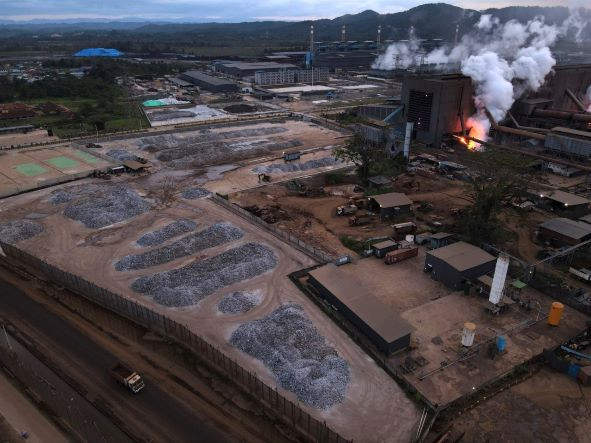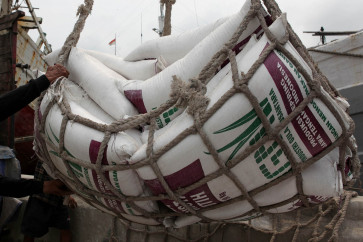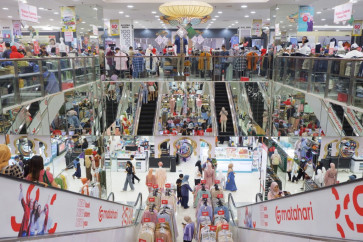Popular Reads
Top Results
Can't find what you're looking for?
View all search resultsPopular Reads
Top Results
Can't find what you're looking for?
View all search resultsCommodity balance scheme may ward off steel import boom
The Indonesian steel industry is expected to reinvigorate domestic production in 2023, after the government introduced a commodity balance scheme in a bid to manage imports and local outputs flow to support a surging demand for the metal goods.
Change text size
Gift Premium Articles
to Anyone
T
he Indonesian steel industry is expected to reinvigorate domestic production in 2023, after the government introduced a commodity balance scheme in a bid to manage imports and local outputs flow to support surging demand for the metal goods.
The Indonesia Zinc Aluminum Steel Industry Association (IZASI) stated that the commodity balance scheme would be a “breakthrough” in decision making for the volume of import licenses, as it would be based on centralized supply and demand data.
Under Presidential Regulation No. 32/2022, the government has laid out the groundwork of the commodity balance, which are meant to simplify trade licenses and give more centralized data for policymakers to determine trade policies.
In September, the government opened a portal for businesses to submit their production plans, import needs as well as local products absorption for next year. The portal includes a total of 24 commodities integrated into the system, including metals, rice, gasoline and liquefied natural gas (LNG).
According to the current timetable, government institutions would determine the final supply and demand plans within this month, while the commodity balance for 2023 are expected to be formalized in December.
“Not only will steel producers benefit, but final consumers will also benefit from getting a guaranteed supply,” IZASI chairperson Stephanus Koeswandi told The Jakarta Post on Thursday.
Stephanus explained that in recent years, the production capacity used to meet domestic steel demand had not been fully utilized, as seen by the average utilization rate of the domestic industry for coated steel which only hit below 50 percent.
IZASI data also showed that coated steel imports had always dominated the majority of the domestic market from at least 2016.
He blamed the cheaper coated steel imports on product specification deception, such as HS code evasion and avoidance of mandatory Indonesian National Standard (SNI), which made imported coated steel cheaper by 20 to 25 percent than locally-produced same products.
The data that the IZASI provided showed that evasion tactics included the insertion of boron substance to cold rolled coil (CRC) which made these products classified as alloy steel rather than carbon steel, which significantly reduced import duty from 20 percent to 0 percent.
Other evasion techniques included adding color resin to coated steel – where the SNI was not yet mandatory – that could reduce manufacturing costs by around Rp 60 million (US$3,936) per year.
For this year, he estimated that the coated steel average market would grow 14 percent year-on-year (YoY) equivalent to 1.8 million tonnes in total volume, while next year’s growth is expected to only reach 10 percent yoy (1.9 million tonnes) due to an expected global recession.
“We actively participate in formulating the steel commodity balance, so that all specifications for coated steel demand can be clearly mapped,” he continued. “If later there is a supply gap, then that is the portion of imports that the government can provide. So fair trade will be created in Indonesia.”
The Indonesian Iron and Steel Industry Association (IISIA) did not respond to the Post's request for comments.
Read also: RI industries struggle with high energy, materials prices
Prioritizing domestic metals
Legal consultant Fikri Selo explained that from a regulatory perspective, the government expects industries to purchase domestic metals if the types required are produced within the country and minimizes exports if domestic demands are high.
However, one point of concern from this policy is how the differentiation of prices is not considered in the commodity balance, as prices have always been one of the factors that impacts domestic production.
“It would be better if the government is taking into account the prices of the average metal commodity knowing the imported metal is often far cheaper compared to the domestic metal, which explains why there's a lot of imported metal demands in accordance with the data” Fikri told the Post on Wednesday.
State-owned Bank Mandiri metals market expert Abrar Aulia warned that although domestic steel production is capable of fulfilling domestic demand, cheaper imported steel from China makes the latter much more competitive.
Abrar argues that China is much more competitive as they have much higher production level economies of scale and are currently experiencing an oversupply of steel, which makes them prone to export.
Indonesian steel producers, on the other hand, are relatively inefficient and mostly utilize scrap raw materials to produce steel, which in itself are imported goods.
“Commodity balances should not be used as the basis for anti-market or anti-competition policies because this can lead to market inefficiency, [otherwise known as] deadweight loss,” Abrar told the Post on Thursday.
Read also: Chinese state-controlled steel giant to take over nickel hub in Morowali: reports
On Sept. 30, the Post joined a live Coordinating Economic Ministry meeting on YouTube that evaluates the government assistance for businesses to fill their commodities needs in 2023.
This meeting was attended by representatives from the Finance Ministry’s National Single Window Agency (LNSW), Industry Ministry metals director, IISIA, IZASI and staff from the Coordinating Economic Ministry itself.
The data for domestic metal needs collected by the Post showed that, per the meeting, around 15.09 million tonnes of imports and 6.7 million tonnes of locals were requested by businesses, which made up a total demand of 21.79 million tonnes, while “total stocks” in 2023 were around 21.42 million tonnes.
In terms of piece metric, import and local demands for next year were estimated to reach around 5.70 billion pieces and 5.99 billion pieces, respectively, creating a total demand of 11.70 billion pieces of metals. Meanwhile, the “total stocks” of 2023 were 684 million pieces.
In order to clarify the data presented in the meeting and to get the latest data when the submission was closed, the Post contacted the LNSW for further information regarding metals demand in 2023.
After an “internal discussion”, the LNSW declined to comment, while directing the Post to fill the information request on the Coordinating Economic Ministry’s website.
A few minutes after the Post contacted the LNSW, the evaluation meeting recording on YouTube was gone.
Until this writing is published, the Coordinating Economic Ministry has not yet provided the requested information.
“In accordance with Presidential Regulation No.32/2022 concerning Commodity Balance, granting access rights must consider the principles of confidentiality and security of state documents based on the provisions of laws and regulations. So the LNSW is not entitled to provide the requested data,” an LNSW officer told the Post on Tuesday.










